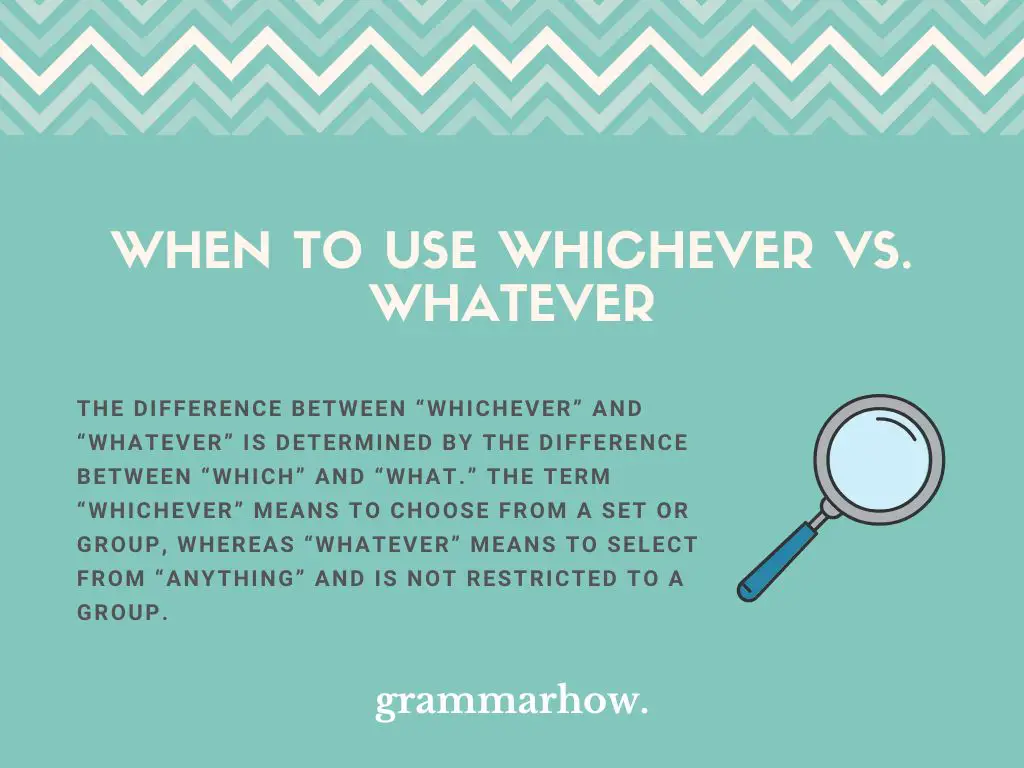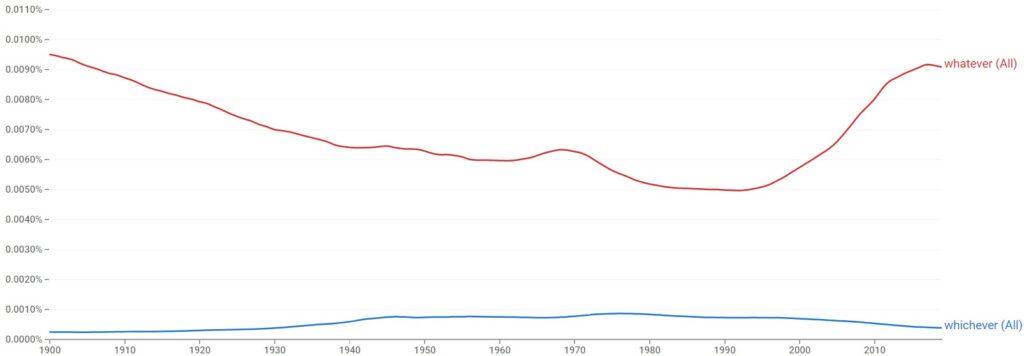The difference between “whichever” and “whatever” is a common source of difficulty for English learners. This page explains the differences and how to use “whichever” and “whatever” in a sentence by providing relevant examples.
When to Use Whichever vs. Whatever
The difference between “whichever” and “whatever” is determined by the difference between “which” and “what.” The term “whichever” means to choose from a set or group, whereas “whatever” means to select from “anything” and is not restricted to a group.

The terms “whatever” and “whichever” are often used as synonyms, but they are technically different. The term “whatever” implies a free choice of anything, while “whichever” indicates that the choice is restricted to a smaller group of the thing being chosen.
The term “whichever” can also mean “it is not important which.”
The term “whatever” is also used as a slightly rude informal way of saying “I don’t care” or “I am not listening.
Here are some examples of “whichever” and “whatever” in a sentence:
- We can do whatever you want tonight. I don’t mind!
- We can go to whichever Chinese restaurant you like. I love them all!
- You can wear whatever you want to the party.
- You can wear whichever of the two dresses you like, but you must wear a dress.
Whichever
The Cambridge Dictionary states that the term “whichever” refers to a choice from a set or to indicate that it is not important “which.”
Here are some examples of “whichever” in a sentence:
- You can choose whichever of the options we talked about last week for vacation. I will be happy.
- You choose the sandwich you want. I will have whichever one you don’t want.
- It will be expensive, whichever way you look at it.
Some common phrases use the word “whichever”, and they have been highlighted in the sentences below.
- We can take the number 10 or 23 bus, whichever comes first
- Overwork can affect you in whichever capacity, either emotional or physical.
- Let me know whichever (time) is convenient for you, either 6 pm or 7 pm,
- Tell me whichever works best for you, Saturday or Sunday.
- We can go to whichever (restaurant) suits you best.
- Choose whichever (wine) you prefer; I like red or white.
- I will take whichever is available; if the chocolate cake is ready, I will have that.
Sometimes the above phrases can also take “whatever”, which results in a change in meaning. You can find the alternatives using “what” in the “whatever” section below this one.
Whatever
According to the Cambridge Dictionary, the word “whatever” means “it is not important what it is” or “it makes no difference” what it is. It is often used interchangeably with “whichever”, but they are different because “whatever” means “any”, while “whichever” means something from a smaller group.
Here are some examples of “whatever” in a sentence:
- I am going out so you can watch whatever you like on tv.
- We can eat whatever you fancy. I can order something.
- You can say whatever you want to him, and he doesn’t respond much.
Here are some of the same phrases included in the “whichever” section, but this time they use “whatever”:
- Whatever comes first – This version doesn’t sound natural because if something is coming “first”, it implies there is a choice. Therefore “whichever” is better.
- I want to carry on working here in whatever capacity I can.
- Whatever time suits you is fine by me.
- Just do whatever works best for you. I don’t care anymore!
- Do whatever suits you best! Of course, that is what you usually do anyway!
- Put whatever (music) you prefer on! I am happy listening to anything.
Which Is Used the Most?
The Google Ngram shows that “whatever” has always been far more common than “whichever”, and its use has continued to grow since the early 2000s.

As mentioned, there is probably some cross-over with people using “whatever” when they should use “whichever.”
There is also no notable difference between American or British English, so the variation must be more based on the structural variation rather than any regional difference.
Final Thoughts
The term “whichever” means “any” from a group or that it is “not important which.” The word “whatever” is similar, and many people use them as synonyms, but it means “it is not important what it is” or “any”, rather than being a choice from a group as with “whichever.”

Martin holds a Master’s degree in Finance and International Business. He has six years of experience in professional communication with clients, executives, and colleagues. Furthermore, he has teaching experience from Aarhus University. Martin has been featured as an expert in communication and teaching on Forbes and Shopify. Read more about Martin here.

